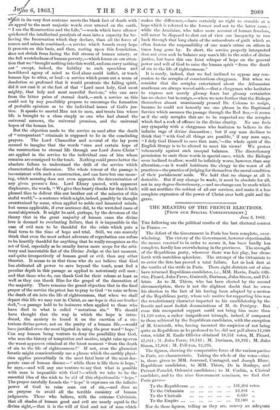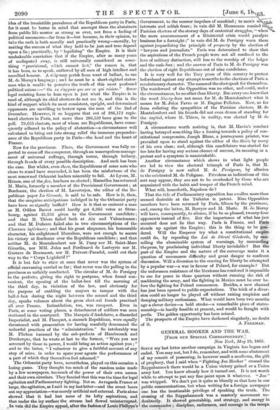THE MEANING OF THE FRENCH ELECTIONS. [FROM OUR SPECIAL CORRESPONDENT.]
June 3, 1863. THE following are the political results of the last electoral contest in France .— The defeat of the Government in Paris has been complete, over- whelming. The victory of the Government, however objectionable the means resorted to in order to secure it, has been hardly less complete, hardly less overwhelming in the provinces. The strength of the Republican party, wherever there was fair play, has shone forth with matchless splendour. The attempt of the Orleanists to re-enter the lists has proved a total failure. Let us look first at the results of the strife in Paris. There eight districts out of nine have returned Republican candidates, i.e., MM. "Lavin, Emile 011i- vier, Picard, Jules Favre, Gueroult, Darimon, Jules Simon, and Pel- letan. As to M. Thiers, who has been elected by the second circumscription, there is not the slightest doubt that he owes his election to the fact of his having been adopted by a section of the Republican party, whose sole motive for supporting him was the revolutionary character imparted to his candidateship by the frantic and most foolish denunciations of M. de Persigny. But even this unexpected support could not bring him more than 11,120 votes, a rather insignificant triumph, indeed, if compared to those achieved by the Republican candidates, with the exception of M. Gu6roult, who, having incurred the suspicion of not being quite as Republican as he professed to be, did not poll above 11,098 votes, whilst M. Emile 011ivier obtained 18,151 votes, M. Picard, 17,044; M. Jules Favre, 18,741; M. Darimon, 18,192; M. Jules Simon, 17,804; M. Pelletan, 12,295.
The figures, showing the comparative force of the various parties in Paris, are characteristic. Taking the whole of the votes—that is, those given to ISIM. Jouvenel, Cantagrel, and Joseph Blanc, Republican candidates, to MM. niers, De is Boulaye, and Prevost-Paradol, Orleanist candidates ; to M. Cochin, a Clerical candidate, and to the nine Government nominees, we find that Paris gave—
To the Republicans ... 131,204 votes.
To the Orleanists 13,204 „ To the Clericals ... ... 6,639 „ To the Empire ...
72,100 91
Nor do these figures, telling as they are, convey an adequate
idea of the irresistible prevalence of the Republican party in Paris, for it must be borne in mind that amongst them the abstainers from public life muster as strong as ever, not from a feeling of political unconcern—far from it—but because, in their opinion, to take the oath is both morally and practically wrong—morally, by making the success of what they hold to be just and true depend upon a lie ; practically, by legalizing" the Empire. It is their unshakeable conviction that if the Empire, after so many years of undispatel sway, is still universally considered as some- thing "provisional, which cannot last,' the reason is, that it has been, so to speak, outlawed by all men of high intellect and unsullied honour. A ship may perish from want of ballast, to use M. de Morny's language ; and he must be a short-sighted states- man who is unable to perceive the truth of this most profound political axiom :—" Oli ne eappuie quo smr ce qui re:9We." Some legal resisting force to lean upon is just what the Empire is in need of, although its chief abettors do not see it, and this is the kind of support which its most consistent, upright, and determined opponents are unwilling to bestow upon the man of the 2nd of December. However, it so happens that out of 286,172 regis- tered electors in Paris, not more than 206,539 have gone to the poll. 79,633 electors, most of whom are Republicans, have conse- quently adhered to the policy of abstention—a circumstance well calculated to bring out into strong relief the immense preponder- ance of the Republican party in Paris—the head and the heart of France.
Now for the provinces. There, the Government was fully ex- pected to come off the conqueror, through an unscrupulous manage- ment of universal suffrage, through terror, through bribery, through frauds of every possible description. And such has been the case. But whilst, even there, the Republicans of some note who chose to stand have succeeded, it has been the misfortune of the most renowned Orleanist leaders miserably to fail. At Lyons, M. Henon, one of thefive, has been re-elected ; Marseilles has returned M. Marie, formerly a member of the Provisional Government ; at Bordeaux, the election of M. Lavertujon, the editor of the Re- publican paper La Gironde, is said to be safe. How is it, then, that the sanguine anticipations indulged in by the Orleanist party have been so signally baffled? 1-low is it that so eminent a man as M. Odilon Barrot could hardly get 6,365 votes at Stras- bourg, against 21,353 given to the Government candidate ; and that M. Thiers failed both at Aix and Valenciennes ; and that M. Dufaure failed also in two circumscriptions of the Charente inferieure ; and that his great eloquence, his honourable character, his enlightened liberalism, were not enough to secure his victory at Bordeaux over the Republican candidate ; and that neither M. de Montalembert nor M. Paasy nor M. Saint-Marc Girardin, nor MM. Jules and Ferdinand de Lasteyrie nor M. Gustave de Beaumont, nor M. Prevost-Paradol, could cut their way to the "Corps Legislatif ?"
It is but fair to state at once that never was the system of official canvassing carried so far ; that never was the polling in the provinces so unfairly conducted. The circular of M. de Persigny to the prefects, giving the right to postpone, when found con- venient, the opening of the ballot-box till the morning of the third day, in violation of the law, and obviously for the purpose of enabling the mayors to tamper with the ballot-box during the night between the second and the third day, speaks volumes about the gross electoral frauds practised all over France. Intimidation, too, was rampant. Even in Paris, at some voting places, a detachment of soldiers was seen stationed in the courtyard. The Marquis d'Andelarre, a discarded Imperialist, and M. Flocquet, a staunch Republican, were equally threatened with prosecution for having manfully denounced the unlawful practices of the "administration." So intolerably was M. Plichon harassed by the sub-prefects of Hazebrouck and Dunkerque, that he wrote at last to the former, "Were you not screened by those in power, I would bring an action against you ; " and to the latter, "I volunteer to give a faithful account of any step of mine, in order to spare your agents the performance of a part of which they themselves feel ashamed."
The Orleanist party have, nevertheless, played on this occasion a losing game. They thought too much of the random noise made by a few newspapers, toomuch of the power of their own names and their own circulars. They fancied that this was the time for legal agitation and Parliamentary fighting. Not so. As regards France at large, the agitation, as I said in my last letter—and the event bears out my appreciation—was merely artificial and external. Paris alone showed that it had lost awe of its lofty aspirations, and that under the icy surface the stream had flowed uninterrupted.
• In vain did the Empire appeal, after the fashion of Louis Philippe's Government, to the meaner impulses of mankind ; to men's interests and selfish fears ; in vain did M. Hausmann remind t Parisian electors of the stormy days of oratorical struggles, "when the mere announcement of a Ministerial crisis would paralyze business for a fortnight ;" in vain did M. de Persigny warn them against jeopardizing the principle of property by the election of " lawyers and journalists." Paris was determined to show that the aspirations of the French people were not all confined to the love of military distinction, still less to the worship of the ledger and the cash-box ; and the answer of Paris to M. de Persigny was the election of eight Republicans out of nine candidates.
It is very well for the Tory press of this country to protest beforehand against any attempt toascribe to the elections of Paris a revolutionary character. The names of the elect speak for themselves. The watchword of the Opposition was no other, and could, under the circumstances, be no other than liberty. But every one knew that the word liberty does not mean for M. de Montalembert what it means for M. Jules Favre or M. Eugene Pelletan. Now, so far from enlisting the sympathies of the Parisian electors, M. de Montalembert and his friends did not even dream of standing for the capital, where M. 'fliers, in reality, was elected by M. de Persigny.
A circumstance worth noticing is, that M. Havin's 'conduct having betrayed something like a leaning towards a policy of con- stitutional compromise, Joseph Blanc, a journeyman printer, was prevailed upon to stand against the editor of the Siecle by many of his own class; and, although this candidature was started far too late for having any serious chance of success, its meaning as a protest and a symptom is unmistakable.
Another circumstance which shows in what light people are led to view the electoral triumph of Paris is, that M. de Persigny is now called M. de Persignac, by allusion to the celebrated M. de Polignac. Frivolous as indications of this sort may appear, they are not to be overlooked by those who are acquainted with the habit and temper of the French mind.
What will, henceforth, Napoleon do ?
That the tide of Parliamentary opposition has swollen more than seemed desirable at the Tuileries is patent. Nine Opposition members have been returned by Paris, fifteen by the provinces, and, among the latter, M. Berryer and M. Marie. M. de Moray will have, consequently, to silence, if he be so pleased, twenty-four opponents instead of five. But the importance of what has just occurred does not lie that way. Paris is France, and Paris stands up against the Empire; this is the thing to be pan- dered. Will the Emperor try what a constitutional empire could do, by repealing the Loi de Siirete Generale, by can- celling the abominable system of warnings, by unmuzzling thepress, by proclaiming individual liberty inviolable? But the past of the Empire and the nature of the entourage make it a question of uncommon difficulty and great danger to confront discussion. Will a diversion to the craving for liberty be attempted by a popular war—a war in favour of Poland, for example? But the unforeseen resistance of the Mexicans has rendered it impossible to sue for peace in those quarters without running the risk of maddening the army, and the fighting in Mexico must be over be- fore the fighting for Poland commences. Besides, a new channel has just been opened to public expectations. The trick of a diver- sion could no longer be played off without raising suspicion and damping military enthusiasm. What would have been two months ago a clever device—a bold stroke—a remarkable piece of states- manship—is hardly feasible at present, and would be fraught with perils. The golden opportunity has been missed.
The prospects of the Empire have darkened singularly, no doubt































 Previous page
Previous page